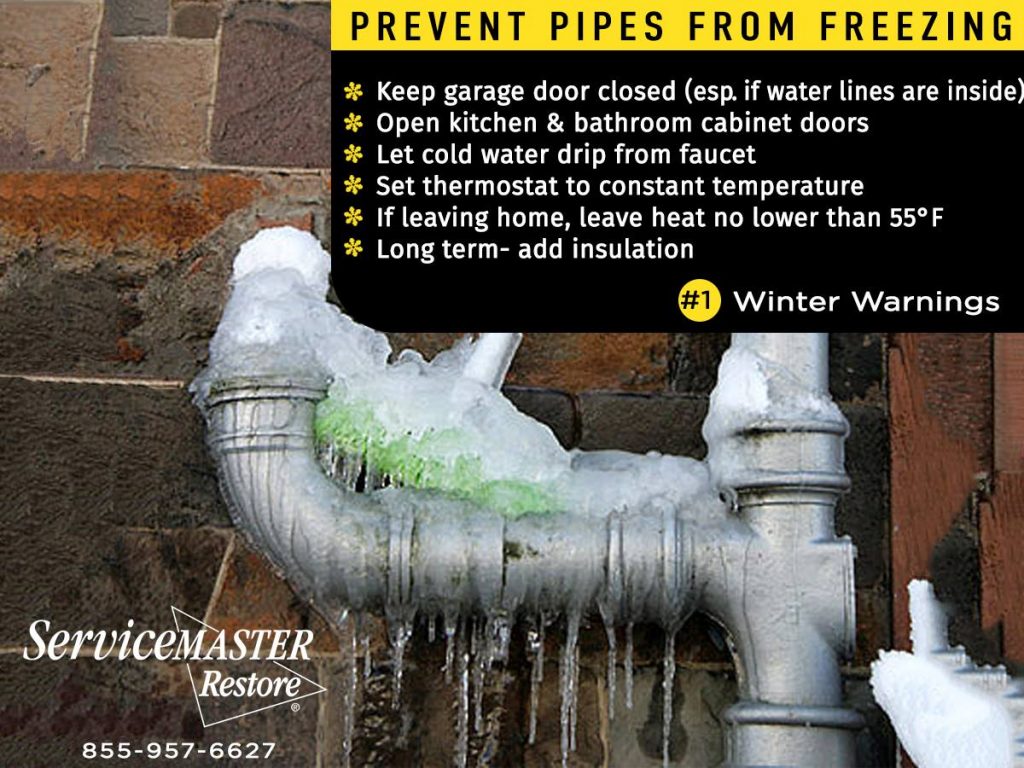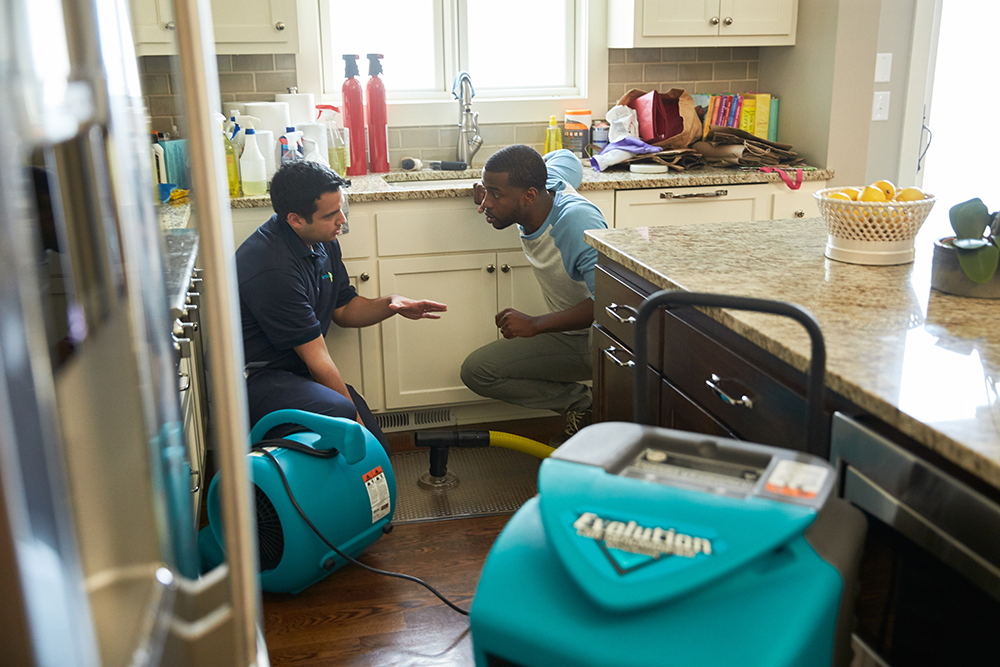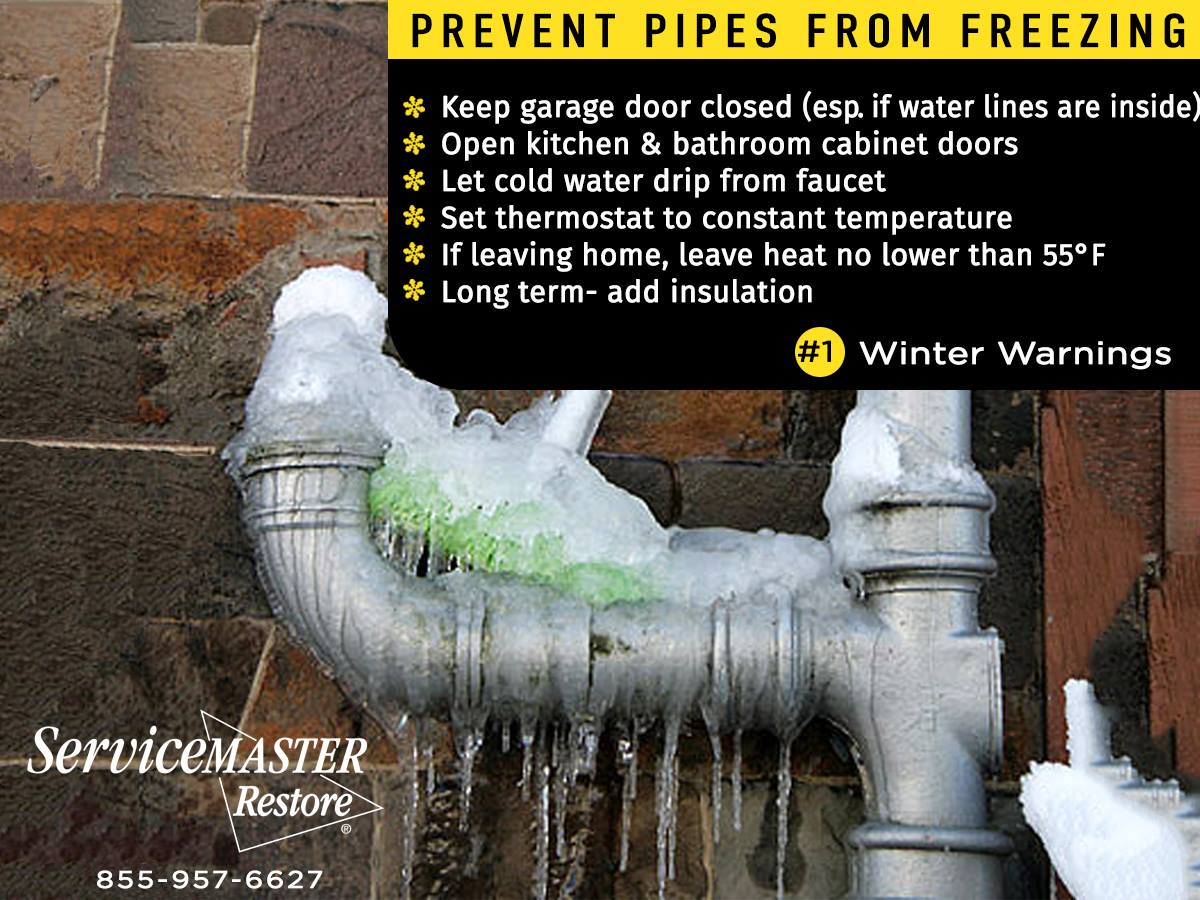Severely cold temperatures serve as a threat to you and your family’s well-being. When such weather approaches, you prepare for it by bundling up to ensure necessary warmth. However, you also need to consider the effect that severely cold temperatures have on your home. When temperatures are below freezing, the pipes in your property are at risk of freezing and bursting.
As water freezes and turns into ice within the pipes, it will expand in size, taking up more room in the pipe than it would as a liquid. If the water expands enough, it will place pressure on the pipes. With enough pressure, the ice will result in burst pipes. Water will then spill out of the pipe and spread throughout your property, causing significant water damage.
While dangerously cold temperatures cannot be prevented, there are things that you can do to protect your property and prevent your home’s pipes from freezing and bursting. Use the following information as a guide on how to prevent frozen pipes this winter and what to do if you find that your home’s pipes have frozen.
Frozen Pipe Prevention
Insulate Pipes
Insulation is a great way to protect your pipes and prevent them from freezing up during the winter. When you insulate your pipes, they are able to retain heat and not get as cold during freezing weather. From wraps to tubing and foam to rubber, there are different types of pipe insulation available and several materials to choose from. For the most part, you can install pipe insulation yourself.
It’s important to thoroughly insulate your pipes to ensure it works effectively. That said, don’t be afraid to be generous when installing the insulation.
Let Faucets Drip

If water is running through the pipes, then this will help prevent the pipe from freezing. Even a faint trickle is effective in preventing frozen pipes, so allow your faucets to drip when you fear a potential freezing. While you may be wary of such a tactic for fear of wasting water, it can save you the time and money of having to deal with the mess of burst pipes and water damage.
Set Thermostat at Consistent Temperature
No matter the time of day, you should leave your thermostat at the same temperature. It’s understandable to want to adjust your thermostat based on your schedule to save yourself money on heating costs. However, for the sake of keeping your home warm enough to prevent pipes from freezing, it’s best to keep the thermostat at the same temperature throughout the day. Otherwise, you may need to spend money on repairs for burst pipes and any resulting water damage.
If you do leave your home for an extended period of time when there’s cold weather, your thermostat should be set to a temperature of at least 55 degrees.
Open Cabinets
Open up the cabinets beneath sinks to allow air in. This gives warmer air the opportunity to circulate in the spaces near the piping, helping to prevent them from becoming too cold. This is especially important if the sinks are on an exterior wall, as they will become cold more easily.
What to Do If You Have Frozen Pipes
If you have frozen pipes that have not burst, you can take the following steps to thaw them and prevent them from bursting.
Turn Faucets On
Much like how running water prevents pipes from freezing, it also helps to thaw them and melt the ice. Even if the water is cold, it will still help melt any ice.
Heat Pipes

To thaw the pipe, you need to apply heat to it, but you should never use an open flame of any sort. Open flames can damage the pipes because of the high heat involved and they may even start a fire. This includes using a blowtorch, a propane heater, and other devices that use an open flame. Instead, try using a portable space heater or hair dryer.
Keep heating the pipes until water pressure has returned to normal. When pipes are frozen, water may only come out of your faucets at a low pressure or trickle. A strong, normal flow of water should indicate that the pipe has been thawed.
Contact a Water Damage Restoration Professional
If you are unable to find the frozen pipe, cannot access it, or are unsuccessful at thawing it, contact a licensed plumber to help you out.
In the event that a pipe on your property has frozen and burst, it’s crucial that you seek immediate help from a professional. ServiceMaster NCR provides water damage restoration services that will help you in the aftermath of a burst pipe. The longer the water sits, the more damage it will cause. The water damage may even result in mold growth, which can be hazardous to your and your family’s health. Don’t hesitate to contact us for help after a pipe bursts on your property. Our technicians will thoroughly remove water from your property and conduct repairs and restoration.
More Information: https://www.servicemaster-ncr.com/tag/winter-weather/













